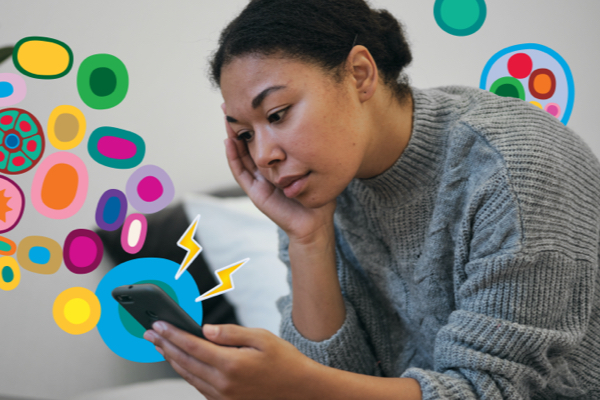Understanding panic attacks
During a panic attack, you might feel overwhelmed and like help is out of reach. It’s important to remember that panic attack symptoms are temporary, and that support is always available.
Jump to section: Signs and Symptoms | Causes | Treatment | Where to get help
What are panic attacks?
Panic attacks are sudden episodes of extreme fear and anxiety. They often happen without warning and can cause intense physical and emotional symptoms.
If panic attacks happen repeatedly and lead to ongoing worry or changes in your behaviour, it may be a sign of panic disorder.
Both panic attacks and panic disorder can be treated to help reduce their impact on your life.

Signs and symptoms of a panic attack
Panic attacks come on quickly. They might last up to half an hour, with symptoms usually peaking within 10 minutes.
Symptoms of a panic attack include:
a strong feeling of dread or danger
a racing heartbeat
shortness of breath
chest pain or discomfort
dizziness or light-headedness
sweating
shaking or trembling
Some people experience panic attacks only occasionally, while others may have them regularly.
What is panic disorder?
Panic disorder is when you experience frequent panic attacks and live in fear of having more. This can start to affect your daily life: a person with panic disorder might avoid certain places or situations, or worry constantly about the next attack.
Treatment for panic attacks
Everyone experiences panic attacks differently, and there are a range of treatment options depending on your symptoms and situation. If your symptoms are mild or occasional, your health professional may suggest strategies you can try at home to manage them.
Here are 5 ways to help manage panic attacks:
1. Practice deep, slow breathing
2. Try mindfulness or meditation to stay present and calm
3. Make time for regular exercise like walking or yoga
4. Reduce or avoid caffeine, alcohol and smoking
5. Connect with friends or loved ones for support
If panic attacks are affecting your daily life or becoming more frequent, it’s important to speak to a health professional. They may recommend therapies such as cognitive behavioural therapy (CBT) or medication to help you manage your symptoms.

24/7 Medibank Mental Health Support
Medibank health insurance members can chat to a mental health professional about how they feel and ask questions about a range of mental health concerns for themselves or a loved one and get guidance on what they can do next. Chat online or call 1800 644 325 anytime of the day or night, 7 days a week at no extra cost.~
Causes and risk factors
There’s often no single cause of panic attacks or panic disorder. For some people, it may be linked to genetics or the way their brain responds to stress. For others, panic attacks could be brought on by stressful life events, or by underlying health issues like thyroid problems or certain heart conditions.
If you’re experiencing panic attacks, it’s a good idea to talk to a health professional to better understand what might be causing them and what support is available.
Where to go for help
If your life or someone else’s is in danger, call 000 immediately.
If you’re in distress and need help, call Lifeline on 13 11 14 for 24/7 crisis support.
For non-emergency support, your GP or regular health practitioner is often the best place to start. They will be able to assess your individual situation and recommend the best next steps for your recovery.
Medibank health insurance members can chat to a mental health professional about how they feel and ask questions about a range of mental health concerns for themselves or a loved one and get guidance on what they can do next. Chat online or call 1800 644 325 anytime of the day or night, 7 days a week at no extra cost.~
Remember that help is always available, no matter the situation.
How can we help?
I want to know how my cover supports mental health
I need help and want to talk
Related articles
Things you need to know
~Some referred services may involve out of pocket costs and waiting periods may apply.
While we hope you find this information helpful, please note that it is general in nature. It is not health advice, and is not tailored to meet your individual health needs. You should always consult a trusted health professional before making decisions about your health care. While we have prepared the information carefully, we can’t guarantee that it is accurate, complete or up-to-date. And while we may mention goods or services provided by others, we aren’t specifically endorsing them and can’t accept responsibility for them. For these reasons we are unable to accept responsibility for any loss that may be sustained from acting on this information (subject to applicable consumer guarantees).



